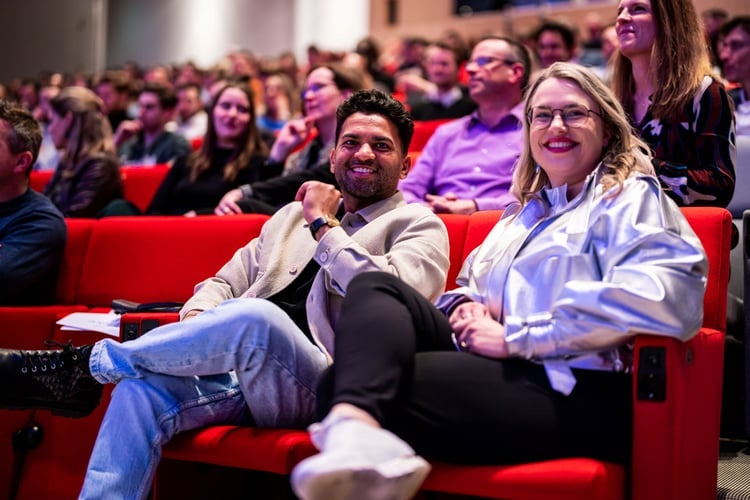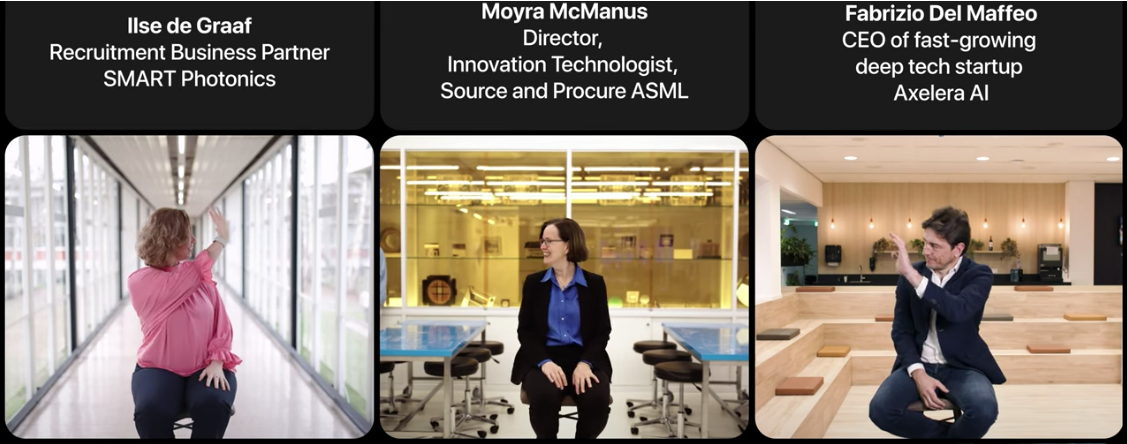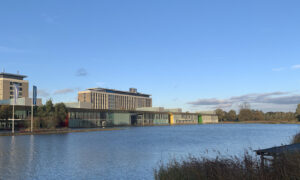(Editor’s note: This post on the new “Talent Game” documentary is part of Dispatches’ Tech Tuesday series. Dispatches covers tech because so many of our highly skilled internationals work in the sector.)
Toward the end of the new documentary “The Talent Game: Battlefield or Playground,” Italian entrepreneur Fabrizio Del Maffeo says he’s confident he couldn’t have founded and expanded a deep-tech company like Axelera AI anywhere but Eindhoven.
An engineer with a business degree from London Business School, Del Maffeo came here because of Philips and all its spin-offs. He points out that the world’s largest chipmaker, TSMC started as part of Philips, as did ASML and NXP. “For a company like us developing AI hardware and software, this is the place to be,” Del Maffeo says.
“This is the place to find talent and expertise. There are very few places in the world like this one.”
An existential challenge
In fact, there is no place like it in Europe: Eindhoven is home to multiple global deep-tech companies with more physicists, engineers, researchers and managers than anyplace outside semiconductor hubs in Silicon Valley or South Korea.
Supplying this booming tech hub with more and better talent is an existential challenge for Eindhoven. The documentary goes to the essence of this challenge: The Brainport region faces a shortage of 70,000 people in engineering and IT during the next decade.
With LVMH and its global fashion industry, Paris will be Paris without deep-tech talent. With Zalando and its e-commerce ecosystem, Berlin thrives with coders and developers. Even Amsterdam, with its dozens of corporate headquarters, would still be Amsterdam without advanced tech talent.
Eindhoven without talent is just another sleepy Dutch village.
To get your arms around what’s at stake, you really need to see “The Talent Game.” Produced and directed by Ingelou Stol, communication manager at High Tech Campus Eindhoven, and Vinal Hindocha, owner of House of Yellow video production studio, the documentary offers an insider’s look at campus residents ASML, SMART Photonics and Axelera AI and their efforts to find and keep talent
Because of the global reliance on ASML, NXP and other semiconductor companies headquartered here, Eindhoven is arguably the most important, and demonstrably the fastest growing, tech hub in Europe.
The Netherlands as a whole has a talent shortage that is projected to persist until 2050, according to Ton Wilthagen, professor of Labor Market at Tilburg University, who’s interviewed in the doc. “Even if we attract more international knowledge workers, work more hours and involve people from the sidelines in the labor market, the talent shortage will remain,” Wilthagen said.

Eindhoven is ready for its close-up
Narrated by Stol, the documentary probes how companies, from multinationals to startups, find and try to retain technical talent. For the world that doesn’t know Eindhoven, Stol has created a great one-stop reference for the scale on which this ecosystem operates. This is what outsiders just don’t get because the Dutch in this area, unlike we Americans, are reluctant to stand out. But the concentration of technology here, and the skilled people needed to keep innovating, is mind-blowing.
High Tech Campus alone hosts the headquarters for – or operations of – almost 300 tech companies and research institutes.
Featured in “The Talent Game” are:
• Moyra McManus, Director, Category Manager Light Sources, Strategic Sourcing. ASML builds the machines essential in making the most advanced computer chips and is the most valuable tech company in the world ranked by valuation. ASML has operations on HTCE and its own campus on the edge of Eindhoven.
• Ilsa de Graaf, recruitment business partner, SMART Photonics. SMART Photonics produces custom photonic chips for specific applications in the auto industry and data centers. The company has 160 employees from 40 countries.
• Axelera AI founder del Maffeo. At Axelera, which creates software and hardware, his teams are laying the foundation for computers with advanced chip architecture that can take unstructured data image input from cameras (or any other sensors) and use artificial intelligence to move from standard computing to data-driven computing.
By any means necessary
Stol’s first question in the doc is, “Have you ever recruited from each other?” and de Graaf answers with a sheepish, “Yes, but only when the talent contacts us. We prefer to recruit from outside the region.” McManus is diplomatic, saying ASML sees the concentration of tech companies and the talent they attract as a rising tide that floats all ships.
Of course, companies raid each other, paying signing bonuses and talent-spotting grads coming out of the Netherlands’ technical universities and, well, using whatever means necessary.
Asked how SMART Photonics gets to undiscovered talent, de Graaf never misses a beat. “By participating in this documentary.”
But clearly, the players have put a lot of statistical analysis into why talents choose to work where they work, and purpose plays into putting the right employees in the right companies. “People aren’t just looking for a job, but a job where their work means something. Especially the young,” says Prof. Wilthagen.
Eindhoven is facing the same generational segmentation, with older talent striving for titles and status, planning career moves as they climb the corporate ladder and younger talent more concerned with making an impact and being part of something great, according to those interviewed.
It’s difficult for Axelera to compete with large companies based on remuneration packages, Del Maffeo says. He uses purpose, freedom and empowerment to attract people from large corporations wanting to do more interesting, meaningful work, he says.
Del Maffeo says his vision of building a European company – “a truly European company, not Dutch, not Italian”– leading the revolution of artificial intelligence resonates with the global go-for-it talents his startup needs. That and Axelera’s culture. “We want missionaries, not mercenaries in this company,” he adds.
His vision and reach don’t stop at the Netherlands border, and Axelera has operations in Leuven, Seattle, Silicon Valley, Austin and Milan.
Getting women into tech
McManus at ASML and de Graaf at SMART Photonics say so far, attracting and retaining talent isn’t a critical problem because they have multiple programs in place to help engineers, physicists and other highly skilled employees make the most of their careers. Both companies recruit via referrals from current employees who rate the companies as great places to work. But McManus adds that ASML has trouble finding technicians for their factories because there are so many companies here building systems.
All those interviewed agreed that getting people off the sidelines, especially women, is critical to Eindhoven’s future.
The percentage of women in the tech workforce is about 30 percent globally, but less than that in Europe. A major theme in the documentary is the potential of women in tech, “who can be an important solution to the talent shortage in the industry,” Stol notes. “Women are an untapped source of expertise.”
Axelera has grown to 160 employees in just two years, but is struggling to find women to design chips. That’s related to Western European culture: Women aren’t studying to become hardware engineers, Del Maffeo said. “That’s why we’re looking outside Europe in Asia, the Middle East and Far East where you see a lot of women who are great engineers.”
Interviews at ASML and SMART Photonics make clear that India is the main supplier of highly skilled internationals, particularly female engineers.
Getting European women excited about tech and engineering is key to winning the talent game, McManus said: “We need to take away the stigma that tech is hard.”
The title “The Talent Game: Battlefield or Playground?” itself sets up a dichotomy. All those interviewed agreed that so far, Eindhoven is a playground. But as tech hubs across Europe mature, including competing Dutch tech centers such as Delft and Nijmegen, it’s likely “The Talent Game” sequel will have a different ending.
––––––––––
Here are the full credits for “The Talent Game”:
Speakers: Fabrizio Del Maffeo (Axelera AI), Ilse de Graaf (SMART Photonics), Moyra McManus (ASML), Paul van Nunen (Brainport Eindhoven), Ton Wilthagen (Tilburg University)
Director: Ingelou Stol & Vinal Hindocha
Video: Vinal Hindocha, Jesse Bischoff
Script & voiceover: Ingelou Stol
Edit: Martijn Nijssen
Production: Lale Boyd, Quinty Cuunders, Dani Fondon
Sound: Lennart Nooren, Joep van den Boogaard, Bronco van Olst
You can see the full video here on YouTube.
Co-CEO of Dispatches Europe. A former military reporter, I'm a serial expat who has lived in France, Turkey, Germany and the Netherlands.















